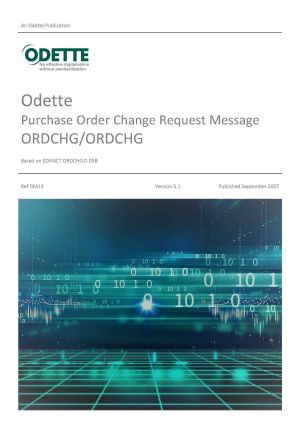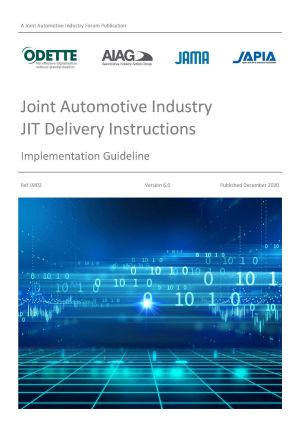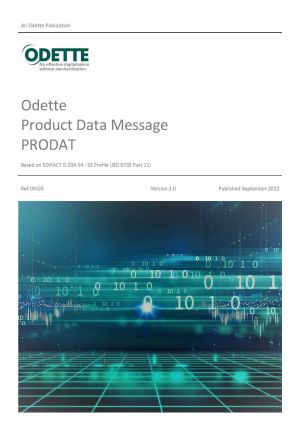Ordering
Purchasing & Scheduling


Purchasing
In the automotive industry, products which are consumed on a regular basis in any part of the organisation away from the production line (non-production items) are often replenished via the use of discrete Purchase Orders (aka Quantity Orders). The frequency of issuing these orders makes them ideal candidates for EDI messaging and Odette has developed message guidelines which cover the sending of Purchase Orders from buyer to supplier, any possible responses from the supplier and any subsequent amendments from the buyer. These guidelines are based on standard EDIFACT Purchasing UNSMs published by UN/CEFACT.
For production parts, the automotive industry generally uses Purchase Orders (aka Contract Orders) to establish overall framework contracts for the supply of components rather than to arrange their actual delivery.
These framework contracts usually cover an extended period, which can be anything from 12 months up to the whole production life of a particular model.
OEMs are increasingly outsourcing the assembly of individual components into larger modules and then fitting the completed modules directly to the vehicle. This means that they need to provide the module assembler with the exact details of the components that make up the module and also keep these details continually updated with any engineering changes affecting either the individual components or the complete assembly. The Odette Product Data EDI message (PRODAT) is specifically designed for this purpose.
Scheduling
After the framework contract is established, delivery requirements are usually communicated separately based on actual production programmes. In contemporary IT systems these requirements are usually sent as EDI messages, which may combine firm delivery instructions for the immediate future with forecasts of likely requirements over the longer term, typically 6 to 12 months.
This method of ordering parts by EDI is still in use in many parts of the industry today, often supplemented by additional ordering methods and messages such as Call-Off, Kanban, Synchro etc., which support JIT and JIS delivery processes, whilst other companies have completely separated the forecast of future demand from the firm delivery instructions.
Global automotive message guidelines, based on the UN/EDIFACT Delivery Forecast (DELFOR) and Delivery Just in Time (DELJIT) messages, have been developed by Odette and our sister organisations in the JAIF to support the industry worldwide and Odette has also developed XML versions of these messages to facilitate the deployment of standardised digital messaging in the lower tiers of the automotive supply chain.
Resources

Odette Purchase Order Message
EDI Implementation Guideline
ORDERR
Based on EDIFACT ORDERS D.05B - Syntax v4

Odette Purchase Order Change Message
EDI Implementation Guideline
ORDCHG
Based on EDIFACT ORDCHG D.05B - Syntax v4

Odette Purchase Order Response Message
EDI Implementation Guideline
REPORD
Based on EDIFACT ORDRSP D.05B - Syntax v4

Odette Price List Message
EDI Implementation Guideline
PRILST
Based on EDIFACT PRICAT D.96A - Syntax v4

Joint Automotive Delivery Forecast Message
EDI Implementation Guideline
DELFOR
Based on EDIFACT D.04A - Syntax v4
(File must be opened with Adobe Acrobat to access attachments)

Joint Automotive JIT Delivery Instructions Message
EDI Implementation Guideline
DELJIT
Based on EDIFACT D.18A - Syntax v4
(File must be opened with Adobe Acrobat to access attachments)

Odette Delivery Schedule Message
EDI Implementation Guideline
DELINS
Based on EDIFACT DELFOR D.96A - Syntax v4

Odette Schedule Exception Handling Message
EDI Implementation Guideline
EXHAND-EXHRSP
Based on EDIFACT DELFOR D.04A - Syntax v4

Odette Call-Off Delivery Message
EDI Implementation Guideline
CALDEL
Based on EDIFACT DELJIT D.98B - Syntax v4

Odette Synchronised Delivery Message
EDI Implementation Guideline
SYNCRO
Based on EDIFACT DELJIT D.03A - Syntax v4

Odette KANBAN Delivery Message
EDI Implementation Guideline
KANBAN
Based on EDIFACT DELJIT D.96A - Syntax v4

Suppliers Long Term Declaration Message
XML Implementation Guideline
Specifies a data exchange procedure and structured format for the transmission of supplier declarations to customers concerning the origin of the parts they are supplying The declaration in the form of an XML message can be processed automatically in the customer system.
Includes XML Guideline, XML Schema file and associated technical artefacts and business rules for the use of the XML Suppliers Long Term Declaration as well as examples visualised as forms.

Odette Application Error and Acknowledgement
EDI Implementation Guideline
APERAK
Based on EDIFACT APERAK D.08A - Syntax v4
This message supports automated error handling for incoming EDI messages such as Despatch Advice or Invoice, including:
- Acknowledgement of receipt of the incoming message
- Reporting of syntax errors which prevent further processing.
- Reporting of actual data errors
